
DISEASES OF THE COLON & RECTUM
Scope & Guideline
Connecting Researchers and Clinicians in Colorectal Care
Introduction
Aims and Scopes
- Colorectal Cancer Management:
Research on the diagnosis, treatment, and management strategies for colorectal cancer, including surgical techniques, neoadjuvant and adjuvant therapies, and outcomes. - Surgical Techniques and Innovations:
Exploration of new surgical methods, including robotic surgery, laparoscopic approaches, and minimally invasive techniques that improve patient outcomes and reduce recovery times. - Inflammatory Bowel Disease (IBD):
Studies focusing on the surgical management of IBD, including Crohn's disease and ulcerative colitis, along with the evaluation of postoperative complications and quality of life. - Pouch Surgery and Complications:
Research on ileal pouch-anal anastomosis (IPAA), complications associated with pouch surgeries, and long-term outcomes for patients with ostomies. - Quality Improvement and Patient Safety:
Investigations into protocols and practices that enhance patient safety, reduce complications, and improve the quality of care in colorectal surgery. - Patient-Reported Outcomes and Quality of Life:
Research that evaluates the impact of colorectal surgical interventions on patients' quality of life, functional outcomes, and overall satisfaction.
Trending and Emerging
- Robotic-Assisted Surgery:
There is a growing trend in research focused on robotic-assisted surgical techniques, emphasizing their benefits in precision, reduced recovery times, and improved patient outcomes. - Enhanced Recovery After Surgery (ERAS) Protocols:
An increasing number of studies are exploring the implementation and outcomes of ERAS protocols, which aim to optimize recovery and minimize complications after colorectal surgery. - Artificial Intelligence and Machine Learning:
Emerging research is focusing on the application of artificial intelligence and machine learning in predicting surgical outcomes, improving diagnostic accuracy, and enhancing treatment strategies. - Telemedicine and Remote Patient Management:
The COVID-19 pandemic has accelerated interest in telemedicine, with research emerging on its effectiveness in managing colorectal patients, including follow-up care and preoperative assessments. - Focus on Quality of Life and Patient-Centered Outcomes:
There is a noticeable trend toward understanding and improving quality of life for patients post-surgery, with research emphasizing the importance of patient-reported outcomes. - Multidisciplinary Approaches in Colorectal Care:
The trend towards integrating multidisciplinary teams in the management of colorectal cancer and complex cases reflects a comprehensive approach to patient care.
Declining or Waning
- Traditional Open Surgery Techniques:
There has been a noticeable decrease in publications focusing on traditional open surgery techniques as minimally invasive and robotic approaches gain prominence in colorectal surgery. - General Surgical Education:
Topics centered around general surgical education for colorectal procedures seem to be receiving less attention, possibly due to the increasing specialization and focus on advanced techniques. - Non-Surgical Management of Colorectal Diseases:
The emphasis on non-surgical approaches, such as conservative management for conditions like diverticulitis or anal fissures, appears to be diminishing in favor of more definitive surgical solutions. - Single-Incision Laparoscopic Surgery:
While initially a hot topic, the prevalence of research on single-incision laparoscopic procedures may be waning as surgeons and institutions reassess its benefits compared to traditional methods.
Similar Journals
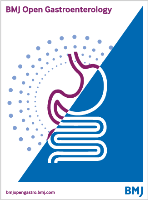
BMJ Open Gastroenterology
Connecting Researchers for a Healthier Gastrointestinal FutureBMJ Open Gastroenterology is a premier open access journal published by the esteemed BMJ Publishing Group, focusing on the dynamic and evolving field of gastroenterology. Established in 2014, the journal has rapidly ascended in stature, reflected in its impressive 2023 Q1 ranking in gastroenterology and its position within the top 25% of journals in the category according to Scopus. With a mission to disseminate high-quality, peer-reviewed research with global significance, the journal provides a vital platform for researchers, professionals, and students alike to share their findings and advancements in gastrointestinal medicine. Operating from its headquarters in London, England, the journal's open access format ensures wide visibility and accessibility of cutting-edge research, making it an invaluable resource for those dedicated to improving patient care and driving innovation in gastroenterological sciences. By engaging with this journal, contributors and readers can stay at the forefront of critical developments in the field, fostering a collaborative environment for knowledge exchange.
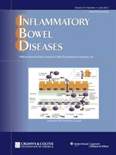
INFLAMMATORY BOWEL DISEASES
Advancing knowledge in gastroenterology and immunology.INFLAMMATORY BOWEL DISEASES is a premier journal published by Oxford University Press, Inc., dedicated to advancing research within the fields of gastroenterology and immunology. With an impressive impact factor reflecting its status as a Q1 category journal in both gastroenterology and immunology and allergy, it ranks 17th out of 167 in gastroenterology and 53rd out of 233 in immunology, underscoring its influence and authority within the scientific community. Since its inception in 1995 and continuing through to 2024, the journal has become an essential resource for researchers, healthcare professionals, and students, serving as a platform for the latest findings in the diagnosis, treatment, and management of inflammatory bowel diseases. While the journal operates under a subscription-based model, it is recognized for its rigorous peer-review process and commitment to publishing high-caliber, impactful studies that contribute significantly to understanding and treating these complex conditions.

Crohns & Colitis 360
Empowering the future of gastroenterology with cutting-edge studies.Crohns & Colitis 360, published by Oxford University Press, is a leading open access journal that has been at the forefront of gastrointestinal research since its launch in 2019. With an E-ISSN of 2631-827X, this journal aims to foster innovation and collaboration within the field of gastroenterology, focusing on diseases such as Crohn's disease and ulcerative colitis. As of 2023, it has earned a commendable Q2 ranking in the gastroenterology category, positioning it among the top 50% of journals in its field, with a Scopus rank of 99 out of 167. Crohns & Colitis 360 not only provides a platform for peer-reviewed research but also seeks to disseminate clinical guidelines, reviews, and groundbreaking studies, making it an essential resource for researchers, healthcare professionals, and students dedicated to advancing the understanding and treatment of inflammatory bowel diseases. Emphasizing accessibility, the journal has been open access since its inception, ensuring that cutting-edge research is readily available to a global audience. This commitment to knowledge sharing significantly enhances its impact and relevance in the ever-evolving landscape of gastroenterology.
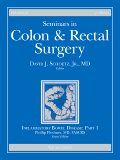
Seminars in Colon and Rectal Surgery
Elevating standards in colon and rectal surgery education.Seminars in Colon and Rectal Surgery is a peer-reviewed journal published by W B Saunders Co-Elsevier Inc, focused on the dynamic fields of gastroenterology and surgical practices related to colon and rectal health. Established in 1996, the journal has evolved to serve as a crucial platform for disseminating innovative research, clinical findings, and thorough reviews relevant to colorectal surgery. It holds an impact factor that reflects its commitment to advancing knowledge in the field, currently ranking in Q4 in Gastroenterology and Q3 in Surgery as of 2023. Researchers and practitioners alike benefit from the latest insights, addressing pivotal topics, treatment paradigms, and surgical techniques that shape modern surgical practices. With a continued focus on enhancing the quality of care in gastrointestinal health, Seminars in Colon and Rectal Surgery plays an essential role in fostering academic dialogue and clinical expertise, making it an invaluable resource for students, professionals, and researchers passionate about advancing the field.

Therapeutic Advances in Gastroenterology
Elevating standards in gastroenterology research.Therapeutic Advances in Gastroenterology, published by SAGE Publications Ltd, is a premier open access journal dedicated to the advancement of knowledge in the field of gastroenterology. Since its inception in 2008 and its transition to open access in 2018, the journal has consistently provided high-quality peer-reviewed research articles, review papers, and clinical studies that address the latest therapeutic advancements and challenges in gastrointestinal medicine. With an impressive impact factor and a 2023 Scopus ranking placing it in the Q1 quartile of gastroenterology journals, it stands as a leading platform for researchers, clinicians, and healthcare professionals. The journal’s commitment to disseminating impactful research has positioned it at the forefront of academic discourse, offering a vital resource for those devoted to improving patient outcomes in digestive health. The United Kingdom-based journal invites submissions that contribute to the understanding and treatment of gastrointestinal disorders, ensuring that cutting-edge findings reach a global audience.

PRACTICAL GASTROENTEROLOGY
Transforming Challenges into Solutions in GastroenterologyPRACTICAL GASTROENTEROLOGY is a distinguished journal dedicated to the field of gastroenterology, published by Shugar Publishing Inc in the United States. With an ISSN of 0277-4208, the journal serves as a pivotal resource for medical professionals, researchers, and students keen on staying abreast of the latest advancements and practical applications in gastrointestinal health. Although it does not currently operate under an Open Access model, it has been a respected publication since its inception, spanning significant years of research from 1989 to 2013 and resuming again from 2016 to 2023. Despite holding a current Q4 ranking in Gastroenterology with Scopus, its commitment to quality insights provides a platform for critical information dissemination, making it an essential read for those engaged in clinical practice and academic research. The journal’s objectives include addressing practical challenges in gastroenterology, bridging the gap between research and clinical implementation, and fostering ongoing education among practitioners in this dynamic field.
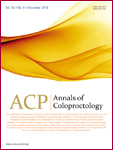
Annals of Coloproctology
Empowering collaboration in colorectal disease research.Annals of Coloproctology, published by the Korean Society of Coloproctology, is a distinguished open access journal since 2011 that plays a pivotal role in the field of gastroenterology and surgery. With a strong focus on advancing knowledge and research in the areas of colorectal diseases, the journal provides a platform for researchers, clinicians, and healthcare professionals to share their findings and insights. The journal holds a commendable Q2 ranking in Surgery and Q3 in Gastroenterology as of 2023, underscoring its significance within the scientific community. Located in South Korea, it is committed to disseminating robust and innovative research that contributes to the enhancement of clinical practices and patient outcomes. The Annals of Coloproctology not only encourages the exchange of high-quality research articles but also ensures accessibility for a global audience, emphasizing the importance of collaborative efforts in tackling colorectal health challenges.
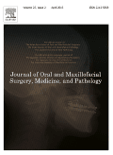
Journal of Oral and Maxillofacial Surgery Medicine and Pathology
Pioneering Research in Surgery and PathologyJournal of Oral and Maxillofacial Surgery Medicine and Pathology, published by Elsevier Science Inc, serves as a vital resource in the multidisciplinary field of oral and maxillofacial surgery, pathology, and related medical disciplines. With an ISSN of 2212-5558 and an E-ISSN of 2212-5566, this journal plays a pivotal role in advancing knowledge and practices from 2012 to 2024. Recognized for its rigorous peer-review process and quality contributions, it has achieved notable rankings in various categories, including Q3 in Oral Surgery and Q3 in Otorhinolaryngology as of 2023. Although the journal does not currently offer an open access option, it remains a key platform for publishing innovative research that enhances patient care and surgical techniques. This journal is an essential read for researchers, clinicians, and students dedicated to the fields of dentistry, pathology, and surgical medicine, ensuring that they remain at the forefront of community advancements and clinical developments.

DIGESTIVE DISEASES AND SCIENCES
Transforming insights into impactful discoveries.DIGESTIVE DISEASES AND SCIENCES, a renowned journal published by Springer, plays a pivotal role in advancing the fields of gastroenterology and physiology. With a rich publication history spanning from 1979 to 2024, this journal not only holds an impressive Q1 ranking in both categories but also ranks 34th out of 167 in Gastroenterology and 60th out of 193 in Physiology according to Scopus, reflecting its significant impact and reputation within the academic community. Despite being a traditional journal without open access options, it remains a crucial platform for researchers, professionals, and students seeking to disseminate their findings and stay abreast of the latest developments in digestive health. The journal is accessible to a global audience and is dedicated to publishing high-quality, peer-reviewed research, making it an invaluable resource for anyone involved in the study or treatment of digestive diseases.
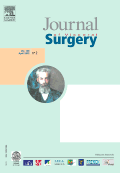
Journal of Visceral Surgery
Connecting Scholars and Practitioners in Visceral SurgeryThe Journal of Visceral Surgery, an esteemed publication from Elsevier Masson, offers a crucial platform for disseminating innovative research in the field of visceral surgery. Operating since 2010 and continually evolving through to 2024, this journal is dedicated to presenting high-quality studies and clinical findings that advance the practice and understanding of surgical techniques and patient care in visceral surgery. With an ISSN of 1878-7886 and a notable impact within the academic community, it achieved a Q2 ranking in Medicine (miscellaneous) and a Q3 ranking in Surgery as of 2023, reflecting its growing influence in the surgical domain. Although it currently does not operate under an Open Access model, the journal remains committed to informing a diverse audience of scholars, practitioners, and students about pioneering methods, case studies, and reviews within the discipline. Positioned in France, the journal serves as an indispensable resource for enhancing surgical practice and fostering collaboration among professionals globally, making it a vital read for anyone invested in the advancement of visceral surgery.